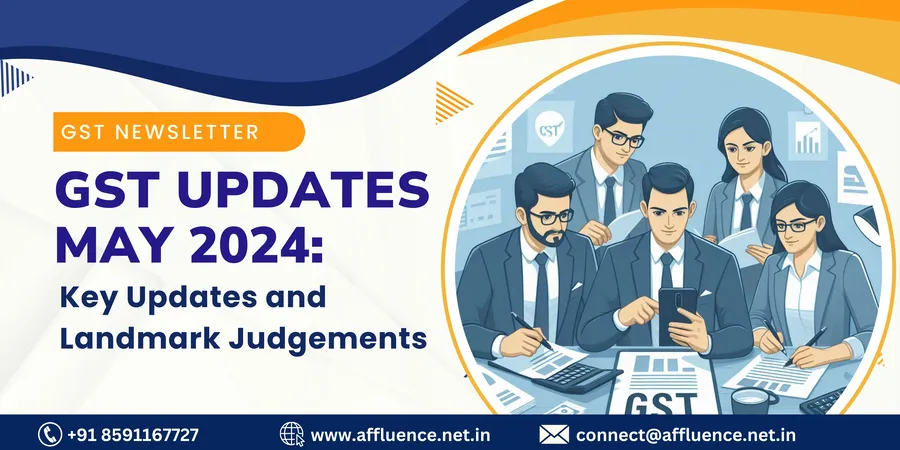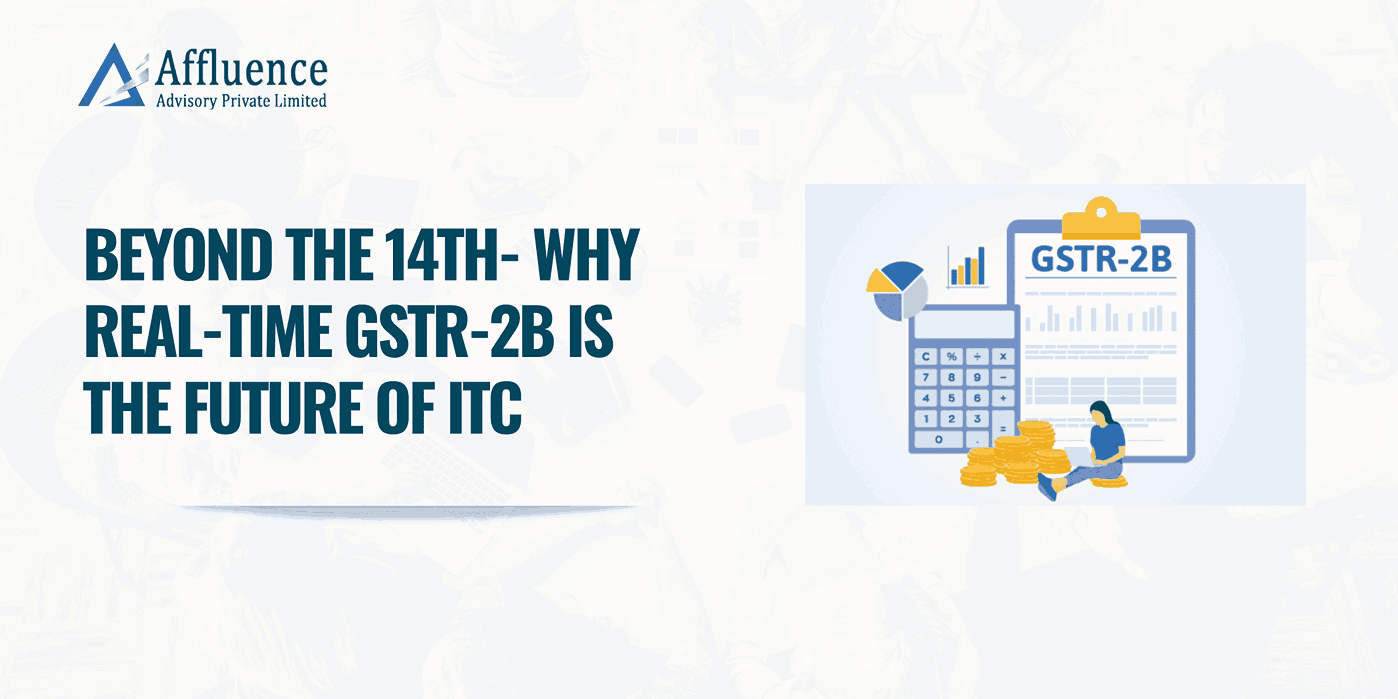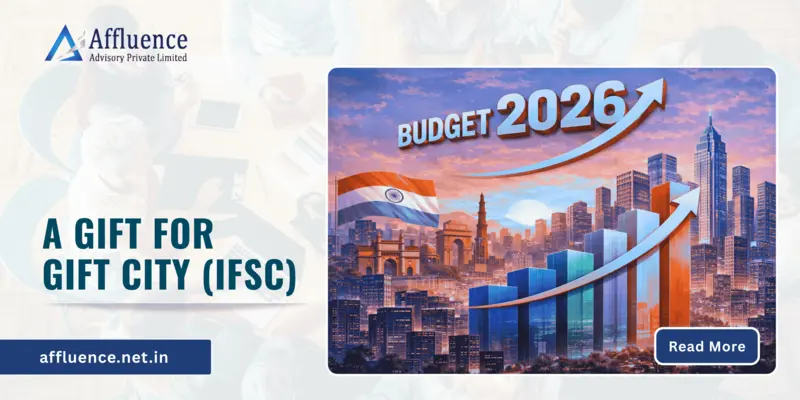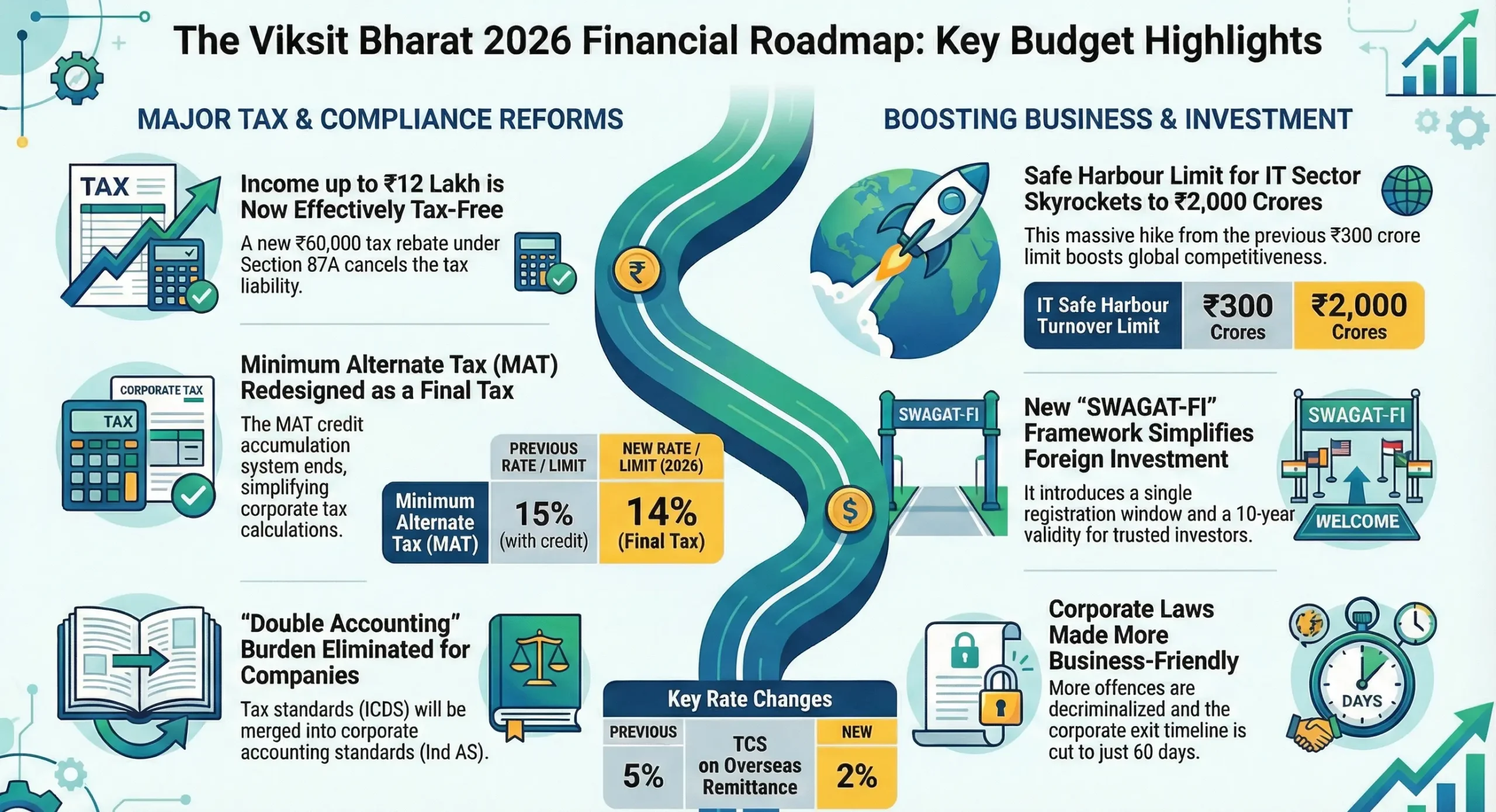Dive into the latest developments in Goods and Services Tax (GST) with our comprehensive May 2024 GST Updates. Uncover crucial changes and landmark court decisions that are transforming the tax landscape. This edition is packed with valuable insights, essential for businesses and taxpayers aiming to stay informed and ahead of the curve.
Section A: News & Updates
- Instruction No. 01/2024-GST dated 30 May 2024.
CBIC has issued the captioned instructions providing guidelines for initiation of recovery proceedings under Section 79 of the CGST Act. Also, reference is made to Section 78 of the CGST Act, which provides for the timeline for initiation of such recovery proceeding.
The key highlights are as below –
- Provisions: –
The co-joint reading of Section 78 and Section 79 of the CGST Act, provides that if the taxpayer fails to pay the demand confirmed in the Order served to him within 3 months from the date of service of Order, proceeding for recovery of the same shall be initiated against such taxpayer. Also, in exceptional cases where it is necessary in the interest of the revenue, after recording the reasons in writing, the proper officer may require the taxable person to pay within such period less than a period of 3 months as may be specified by him.
- Guideline provided in captioned Instruction: –
- CBIC vide Circular No. 3/3/2017-GST dated 5 July 2017, has clarified that the jurisdictional Deputy/Assistant Commissioner of Central Tax is the proper officer for recovery under Section 79 of the CGST Act, 2017. In terms of Proviso to Section 78 of CGST Act i.e. recovery proceedings to be initiated before completion of 3 months, proper officer shall be the Principal Commissioner/ Commissioner of Central tax.
- In light of the captioned instruction, in scenarios where the jurisdictional Deputy/ Assistant Commissioner of Central Tax, in the interest of the revenue is of the view that the recovery proceedings needs to be initiated pursuant to an Order, before the expiry of three months from the date of service of Order, then he needs to place the matter before the jurisdictional Principal Commissioner/Commissioner of Central Tax along with reasons/justification for such an action. The jurisdictional Principal Commissioner/Commissioner of Central Tax shall examine the said reasons/justifications at the earliest and if he is satisfied with the requirement for expediting the recovery in the said scenario, then he may, after recording such reasons in writing, issue directions to the concerned taxable person to pay the said amount within the period specified by him in the said directions. Copy of such directions must be sent to the jurisdictional Deputy/Assistant Commissioner of Central Tax for information.
- The said instruction also provides that jurisdictional Principal Commissioner/Commissioner of Central Tax should provide specific reasons for asking the taxable person for early payment of demand confirmed as per Order, clearly outlining the circumstances prompting such early action. Such specific reasons requiring early payment of the recovery amount could include high risk to revenue involved in waiting till the completion of three months period due to – (a) apprehension of closure of business by the concerned taxable person in near future, (b) possibility of default due to taxable person’s declining financial conditions or impending insolvency, (c) likely initiation of proceedings under the Insolvency and Bankruptcy Act
- Further, the instruction provides that reasons to believe for the apprehension of risk to revenue should be based on credible evidence, which may be kept on record to the extent possible. While issuing any such directions, the proper officer must duly consider the financial health, status of business operations, infrastructure, and credibility of the taxable person, and strike a balance between the interest of the revenue and ease of doing business.
- Wherever such directions are issued by the jurisdictional Principal Commissioner/Commissioner of Central Tax and where the taxable person fails to make payment of the said amount within the period specified in the said directions, the jurisdictional Deputy or Assistant Commissioner of Central Tax shall proceed to recover the said amount as per the procedure specified in sub-section (1) of section 79 of CGST Act.
Section B: Summary of Case Laws (GST)
- SINCON INFRASTRUCTURE PVT. LTD. VERSUS THE UNION OF INDIA [2024 (5) TMI 264 – PATNA HIGH COURT]
In this case, the petitioner has approached HC with respect to recovery proceedings initiated for interest amount on account of delay in filing of returns. Pursuant to audit by department for 17-18 and 18-19, SCN was issued under Section 74 of CGST Act covering certain observations from Audit and for interest amount, recovery proceedings were initiated. Hence, petitioner filed the present writ.
Petitioner in this case submitted that in light of Proviso to Section 50(1) of CGST Act, interest shall be applicable only on the tax paid by debiting cash ledger. Hence, for the period FY 18-19 wherein the payment of tax was made through utilization of credit from electronic credit ledger, interest shall not be applicable for delay in filing of return. Also, petitioner submitted that in case of tax paid through ITC, the said amount is already deposited with the Government by the supplier and setting off the same towards outward tax liability is merely a book adjustment, Further, petitioner submitted that the proviso added to Section 50(1) of CGST Act was to correct an anomaly in Section 50(1). Therefore, interest is applicable only on part of tax amount paid in cash.
HC while discussing levy of interest in term of Section 50(1) and its proviso, has evaluated both interest applicable in case of tax paid through utilization of credit and cash deposited in electronic cash ledger but not utilized before the due date of return. HC stated that Section 50(1) and its proviso cannot be interpreted in isolation. Section 39(7) of CGST Act, requires a registered person to pay to the Government the tax due as per GSTR-3B not later than the last day of filing the return. Hence, payment of tax is to be made along with furnishing of return on the last date or any date prior to that. Similarly, the credit to electronic credit ledger occurs only on furnishing of return, HC also stated that the mere fact that the supplier has remitted tax to Government on the purchases made by the assessee would not by alone create a credit in electronic credit ledger.
Further, HC while discussing the definition of electronic cash ledger, stated that said ledger is akin to current account maintained with a bank wherein no interest accrues with only condition that debit made has to be against payment of tax, interest, penalty or any other dues. Again, ITC in electronic credit ledger accrues only when return is filed and not when tax is paid by an assessee as a purchase to its supplier.
HC also discussed that the heading of Section 50(1) of CGST Act reads as ‘Interest on delayed payment of tax’. Consequently, it was held that whether it is electronic credit ledger or cash ledger, interest is payable on delay occasioned in payment of tax, wherein payment is occasioned only on furnishing of return and simultaneous debit made from either of these ledgers i.e. Cash or Credit ledger. The payment of tax and furnishing of return have to occur simultaneously and none can separate one from the other.
HC while collectively interpreting Section 50(1) of CGST Act and the proviso held that the interest in terms of provisions of Section 50(1) gets triggered in case of delayed furnishing of return since it is furnishing of returns which results in payment of tax, interest, penalty or any other statutory dues under the Act. Hence, neither the deposit made in the cash ledger nor the remittances made on the tax paid on purchases, results in payment of the tax to the Government.
Insofar as the payment of tax by the supplier on the purchases made by an assessee, even the credit of the input tax occurs in the Electronic Credit Ledger only when the return is furnished on self-assessment raising a claim for input tax.
M/s AGARWAL COAL CORPORATION PVT LTD VERSUS THE ASSIST. COMMISSIONER OF STATE TAX [2024-VIL-356-BOM]
The said case deals with ‘GST on Ocean Freight’ in case of FOB transaction. The petitioner has challenged the impugned SCN wherein the department has sought to invoke the Notification No. 8/2017-Integrated Tax (Rate) which itself has been struck down by the Division Bench of Gujarat HC in the case Mohit Minerals Pvt. Ltd. Vs. Union of India [2020 (33) G.S.T.L. 321 (Guj.) – 2020-VIL-36-GUJ] and whereas the said decision of the High Court of Gujarat was carried in appeal before the Supreme Court in the case Union of India Vs. Mohit Minerals Pvt. Ltd.” [2022 (61) G.S.T.L. 257 (SC) – 2022-VIL-30-SC] and a three Judges Bench of the Supreme Court by a decision has upheld the decision of the High Court and concluded that tax on the supply of a service, which has already been included by the legislation as a tax on the composite supply of goods, cannot be allowed.
In the said regard, the respondents contended that the decision in Mohit Minerals (supra) needs to be applied only in respect of cases which involve contracts on CIF basis (sum of Cost, Insurance and Freight) and not FOB (Free on Board) Contracts. In the present case the show cause notice was issued because the contract was a FOB contract.
The Hon’ble HC found such argument as totally untenable as the case in Mohit Minerals (supra) before the High Court of Gujarat was a case which involved both categories of contract namely CIF and FOB and was also noted in the said judgement. Therefore, the HC declared the revenue’s decision ultra vires of the IGST Act because once the notification itself has been declared as ultra vires and the Supreme Court has upheld the same, applying the same by State authorities would mean applying an illegal notification. Thus, HC opined that, the present petition also needs to be allowed considering the decision in the case of Mohit Minerals (supra) and accordingly directed the respondent to refund the amount of tax paid under protest with interest @ 7% p.a. within stipulated time.
M/S. SAVIO JEWELLERY VERSUS COMMISSIONER [2024 (5) TMI 658 – RAJASTHAN HIGH COURT]
This petitioner in the captioned case is assailing the impugned order wherein tax is imposed on the exhibition services received by the petitioner in non-taxable territory from the person located in non-taxable territory on RCM basis.
The petitioner contended that in view of Section 1 of the CGST Act and the IGST Act 2017, the provisions of the Act shall extend to the whole of India. Thus, the petitioner (a jeweler) who participated in an exhibition outside India cannot be taxed under IGST Act in India. However, the respondent contended that Section 13 of the IGST Act provides for services received outside India and sub-section (5) of Section 13 of IGST Act includes fair and exhibition. Further, entry no.1 of Notification No. 10/2017-Integrated Tax (Rate) dated 28.06.2017 issued in terms of Section 5(3) of the IGST Act provides that any person located in the taxable territory is liable has to pay GST under RCM on any service supplied by any person located in a non-taxable territory other than non-taxable online recipient.
The said notification was not challenged by the petitioner in this petition. Upon perusal of Section 13 of the IGST Act pertaining to the place of supply provisions and in light of the above-mentioned Notification HC was of the view that the supply of services took place outside India and the receiver of service i.e. the Petitioner is a person registered in India i.e. the taxable territory.
Therefore, HC found no reason to entertain the captioned writ as the services received outside India is taxable in the hands of the recipient who is registered person in India. Consequently, the writ petition being devoid of merits was dismissed.
BHOLE BABA MILK FOOD INDUSTRIES LIMITED VERSUS UNION OF INDIA AND 2 OTHERS [2024 (4) TMI 949 – ALLAHABAD HIGH COURT]
The petitioner in the captioned case seeks permission to allow the filing of the GSTR-3B return and further seeks refund of interest and penalty amounting to INR 1,07,710/- and INR 100/- respectively, which were debited due to alleged late filing.
In this case the petitioner had generated corporate e-payment Challan before the due date i.e. on 19 May 2023, however its bank (SBI) approved the same on 25 May 2023 i.e. after the due-date. The bank claimed that the amount was credited to the GST Tax Pooling Account, however GSTN in its affidavit stated that the said amount was not remitted by the bank till 25 May 2023.
In the said regard, Hon’ble HC held that the petitioner had initiated the payment within the prescribed time and should not be held liable for delays attributed to the bank. Therefore, “failure” in timely payment of tax cannot be attributed to the petitioner and since the levy of late fee and interest arise only in the event of “failure” to file timely return, the court deemed the penalty and interest charges unwarranted. Accordingly, HC allowed the amount of interest of INR 1,07,710.51/- and penalty of INR 100/- deposited by the petitioner under protest to be adjusted against the tax liability for the month of April,2024 onwards without incurring any liability as to interest on that amount.
SRI GOPIKRISHNA INFRASTRUCTURE PVT. LTD. & ORS. VERSUS THE STATE OF JHARKHAND [2024 (4) TMI 851 – JHARKHAND HIGH COURT]
In the captioned case, a batch of writ petitions are clubbed together since they have identical facts. The petitioner is a contractor who has been granted a contract for rural electrification under the Dindayal Upadhyay Gram Jyoti Yojna (DDUGJY), and along with other petitioner-firms were seeking reimbursement of the GST paid by them for the procurement of raw materials, intermediary components etc. and the bought-out items. The said transactions, categorized as ‘indirect transactions’, GST on the same was considered non-reimbursable by the respondents and barred under clause 31 of the General Conditions of Contract (hereinafter referred as GCC).
Further, since the facts of this matter were analogous to the case of M/s. Techno Electric and Engineering Company Limited W.P (T) No. 4885 of 2022 adjudicated by the co-ordinate Bench of Jharkhand HC, the same was heavily relied upon by the petitioner-firms. Since the implementation of the rural electrification works, fell under the definition of “Supply” under Section 7 of the CGST Act, here also, the concerns about the differentiation made between direct (wherein GST component was paid separately by respondent) and indirect transactions including the reimbursement of GST on the same was raised. In the said regard, the writ court had held that the denial of reimbursement of GST impact on indirect transactions offends the equality clause under Article 14 of the Constitution of India. Also, it shall breach the rule of promissory estoppel and be against the doctrine of legitimate expectation. Subsequently, it was held that clause 31 of the GCC cannot be read in a manner so as to obliterate the impact of the amended clause 10.7 of the GCC and in view of Section 64A of the Sale of Goods Act, 1930, the respondents are under an obligation to pay the taxes, duty and levies in the event of any change in the law. The Contractor has a right to add such additional amount of tax to the contract price and recover the GST impact from the respondents. This Judgement was challenged by the State of Jharkhand in the Supreme Court. However, the Special Leave Petition (SLP) was dismissed stating that they see no reason to interfere in the instant case based on the factual aspects involved therein although the issue w.r.t the question of law was left open to be considered.
In light of the above, the petitioner-firms contended that the order passed by the co-ordinate Bench of Jharkhand HC, in the referred case of M/s Techno Electric and Engineering Company Limited which is also affirmed by the Hon’ble Supreme Court after an adjudication on facts. Relying upon the said judgement, it was further contented by the petitioner firms that a judgment rendered on facts cannot be reopened and deviated from, by another co-ordinate Bench of the Court and therefore the judgment of the co-ordinate Bench in M/s Techno Electric and Engineering Company Limited shall be binding on this Bench.
Hon’ble HC held that when a Special Leave Petition is dismissed in limine, the order passed by the High Court does not merge with the dismissal order passed by the Hon’ble Supreme Court and only therefore, the aggrieved party can move a petition for review of the order/judgment of the High Court. However in light of apex court’s precedents, in cases having identical set of facts, there cannot be more than one decision governing the same subject-matter. Additionally, it was also held that even in contractual matters, the State and its instrumentalities are required to follow the equality clause under Article 14 of the Constitution of India. As a result, the captioned writ petitions were allowed and it was held that the petitioner-Firms are entitled for reimbursement of the GST along with statutory interest in terms of the GST Act, 2017 read with the Rules framed thereunder. Accordingly, Jharkhand Bijli Vitran Nigam (in short, JBVNL) shall calculate and reimburse the petitioner-Firms the GST component paid by them and it shall release the withheld amount from the bills of the petitioner-Firms, if any.
LOKENATH CONSTRUCTION PRIVATE LIMITED VERSUS TAX/REVENUE GOVERNMENT OF WEST BENGAL AND OTHERS [2024 (5) TMI 362 – CALCUTTA HIGH COURT]
In the said writ petition, the appellant had challenged the impugned order of the assessing officer who reversed the Input Tax Credit availed by the appellant on the ground that that the appellant had availed and utilized Input Tax Credit in contravention of Section 16 (2)(c) of the CGST Act. That is, the appellant had failed to produce any evidence ascertaining that suppliers had paid tax to the Government. Further, the certificates issued by the Chartered Accountants were also rejected stating that they do not match with the facts stated in the returns as available on the GSTN portal.
The Hon’ble HC referring the Apex court judgement in case of Bharti Airtel Ltd. [2021 (11) TMI 109 – SUPREME COURT] held that Form GSTR-2A is only a facilitator for taking a confirm decision while doing self-assessment. Non-performance or non-operability of Form GSTR-2A or for that matter, other forms cannot be availed, because the dispensation stipulated at the relevant time obliged the registered persons to submit
Return on the basis of such self-assessment in Form GSTR-3B manually on electronic platform.
Further, the said decision in case of Suncraft Energy Private Limited Versus Assistant Commissioner of State Tax (2023) 9Centax 48 (Cal) is relied hereon with full force. The Hon’ble Calcutta High Court while passing its verdict, which stated that – The respondent without resorting to any action against the selling dealer has ignored the tax invoices and the bank statements produced by the appellant to substantiate payment of tax, made. Only in exception cases where the department is able to bring out that
- there is a collusion between the assesse and the supplier, or
- the supplier is missing, or
- the supplier’s business has closed down or
- the supplier does not have any assets and such other contingencies;
Can the department direct the appellant to reverse the input tax credit and remit the same to the government.
Accordingly, the impugned order was set aside and appeal was allowed.
M/S RAJSHI PROCESSORS, RAEBARELI VERSUS STATE OF U.P. [2024 (5) TMI 1316 – ALLAHABAD HIGH COURT]
In the captioned case, the petitioner has sought review of the Judgement/Order passed by the Allahabad HC in the writ. The petitioner, engaged in manufacture and sale of aluminum casting & machinery parts. Special Investigating Branch had conducted a survey of these vendors whereupon it came to light that these vendors are non-existent and bogus firms and alleged that the petitioner has fraudulently availed the ITC without actual receipt of goods from these vendors.
Petitioner in support of its claim of actual receipts of inward supplies, had submitted invoices, copies of GR, e-way bill, ledger, bank statements evidencing payment against the transaction through RTGS and evidence of physical receipts of goods. The inward supplies were entered even in the stock register.
The Appellate Authority found that the goods receipts of transporter submitted by petitioner is to merely prove the actual receipt of goods since the GSTIN mentioned on these goods receipts is invalid, mobile number is of a different person. Therefore, no goods were actually transported and there is only paper transactions. HC while deciding the writ has held that in terms of Section 16(2) of CGST Act, registered person claiming ITC should have actually received the goods. By merely producing document in terms of Rule 36 of CGST Rules without actual receipt of goods, the person shall not be entitled for the benefit of ITC. Further, the argument that these vendors were registered on the date of transaction cannot be ground for granting the benefit of ITC.
The petitioner has sought review of the judgement of HC on the ground that the said judgement does not deal with the material presented by the petitioner on record. Also, petitioner has stated that Court has blindly believed the stand of the revenue that the supplier firm were bogus and non-existent as no survey was conducted before or after cancellation of registration of these firms.
Further, petitioner has relied upon Order 47 Rule 1 C.P.C. provides for filing of an application for review of judgement on the basis of discovery of important matter or evidence, which was not in knowledge of petitioner, The petitioner had filed e-stamp affidavit of transporter to prove bona fide transaction and the movement of goods.
HC upon examining the grounds taken in review petition and the judgement relied, held that even counsel while presenting the case could not point any specific material which was placed before Court and not taken into consideration. Hence, the argument of the petitioner that Court did not deal with the material presented is without any substance. With respect to submission that HC has blindly relied upon the revenue’s stand, HC stated that it has gone through all the evidences presented by respondent i.e. survey conducted by investigation wing, findings of appellate authority that the GSTIN on goods receipts issued by transporter is invalid and incorrect mobile number. Also, petitioner did not place on record to rebut the findings of respondent, therefore, the said judgement does not require any interference.
Further, HC came heavily upon the learned Advocate of the petitioner for the disrespectful manner of drafting the review petition by putting an allegation that the court has blindly believed the stand of the revenue. With respect to the submission of affidavit from transporter, Court found that the said copy of affidavit does not bear any stamp of notary, also, the same could have been very well produced before Appellate Authority but the same was not done. Moreover, it supports the findings of the appellate authority that the GST number and the mobile number mentioned on the transporter’s receipt were fake. Therefore, the copy of the affidavit of the transporter filed by the petitioner along with the review application does not provide any good ground for review of the earlier order. Hence, review petition is dismissed.
M/S MAPLE LUXURY HOMES VERSUS STATE OF RAJASTHAN, UNION OF INDIA. [2024 (5) TMI 717 – RAJASTHAN HIGH COURT]
The petitioner is engaged in the construction and development business. He received advance consideration on account of agreed supply of a flat from the buyer and discharged GST on the same. Before completion of the construction, the said booking of flat was cancelled. Accordingly, petitioner sought refund of GST amount since the supply could not be completed due to cancellation of agreement. Hence, refund application was filed in the said regard. Authorities issued a non-speaking notice in Form GST-RFD 08 and the petitioner filed the reply to show cause notice on speculative basis in Form GST RFD-09. In the Order passed, the reason for rejection of refund was provided. Hence, petitioner has challenged the same on the ground that there is violation of principles of natural justice incorporated under statutory scheme of Rule 92 (3) of the Rules of 2017.
HC observed that Rule 92(3) of CGST Rules incorporates the principal of natural justice. Therefore, if the officer is of the view that a refund is liable for rejection, he is required to communicate the same through a notice in Form RFD-08 clearing stating the reason for rejection. Without communicating the reason for rejection, the whole object of said provision is lost. Therefore, in the present case wherein the Order contains the reason for rejection and without providing the same in the SCN there is there is apparent violation of statutory provisions incorporating principles of natural justice.
Therefore, the contention of the respondent that alternate remedy is available shall not withhold any substance, hence, the impugned orders were set aside and the matter is remitted to proper office for issuance of proper notice in RFD-08.
ASHIKA BUSINESS PRIVATE LIMITED VERSUS UNION OF INDIA [2024 (5) TMI 1213 – GAUHATI HIGH COURT]
In this case, HC dealt with couple of issues, among which the crucial one related to maintainability of writ petition in case of an alternate remedy, HC held that availability of alternate remedy is not a bar for maintainability of writ petition in terms of Article 226 of the Constitution of India. Further, HC discussed the difference between, ‘entertainability’ and ‘maintainability’ of writ petition. HC noted that both these concepts are different concepts wherein entertainability is complete at the discretion of HC considering the facts of the case and maintainability deals with merits of the case.
Another interesting issue dealt by HC in this case was with respect to contention of the petitioner that SCN and Order has been issued by different authorities. HC on the said contention held that when an adjudicating authority is required to adjudicate on the basis of grounds mentioned in Demand-cum SCN and the grounds urged in the reply to SCN, the contention that one authority has issued SCN and the other authority has issued Order cannot be accepted. Also, considering the fact that Order has been issued considering the grounds raised in the SCN.
M/S ABANS ALTERNATIVE FUND MANAGER LLP [2024 (4) TMI 844 – AUTHORITY FOR ADVANCE RULING, GUJARAT]
The applicant in the captioned case had sought a ruling on the below mentioned question viz;
Whether an applicant, which is a SEZ Unit, is required to pay tax under reverse charge mechanism on services received from advocate by virtue of Notification No. 10/2017-Integrated tax Rate (as amended time to time)?
Ruling: In this case, the Advance Ruling Authorities have drawn an inference from the clarification issued by TRU, CBIC, and New Delhi in case of specific SEZ unit. In the said clarification given to a SEZ unit, it was clarified that a SEZ unit or a SEZ developer can procure services wherein GST is payable under RCM, without payment of IGST provided the said unit or developer furnished a LUT. It was also clarified that the actual recipient of service is the deemed supplier/registered person who is required to furnish LUT and fulfilling other conditions thereon.
The ruling aligns with the Government’s intent to promote tax-free procurement for SEZs, ensuring that SEZ units can operate without the burden of GST on such services, thereby facilitating their authorized operations.
SANYUKTA BHATTACHARJEE VERSUS UNION OF INDIA AND ORS [2024 (5) TMI 315 – CALCUTTA HIGH COURT]
The captioned case deals with condonation of delay in filing of appeal before appellate authority. The petitioner, being aggrieved with the Order determined under Section 73 of the CGST Act, had filed an appeal under Section 107 of CGST Act. However, the appeal was filed beyond the period of limitation (Section 107(4) of the CGST Act) and therefore was accompanied by an application under Section 5 of the Limitation Act, 1963 requesting condonation of delay. The appellate authority rejected the said application and disposed of the appeal.
HC, noticed that the identical issue was dealt by the Hon’ble Division Bench of this Court in the case of S.K. Chakraborty & Sons v. Union of India (2024) 123 GSTR 229. HC while considering the scope and ambit of section 107 of CGST Act and applicability of Section 5 of Limitation Act, 1963 on the basis of provisions contained in Section 29(2) of the Limitation Act 1963 and by placing reliance upon the judgement of apex court in case of Superintending Engineer/Dehar Power House Circle Bhakra Beas Management Board (PW) Slapper and another versus Excise and Taxation Officer Sunder Nagar/Assessing Authority [2019 (11) TMI 6 -SUPREME COURT], concluded that the since these provisions are not specifically excluded in GST, it would be improper to read implied exclusion.
Having regard thereof, the delay in preferring the appeal under Section 107 of the said Act is condoned and appeal is restored to its original file and number.
M/S. JALAJOGA VERSUS THE STATE OF WEST BENGAL & ORS. [2024 (5) TMI 773 – CALCUTTA HIGH COURT]
In the captioned case the petitioner has challenged the appellate authority decision of not condoning the delay in filing of the appeal under Section 107 of the CGST Act, 2017. The petitioner, being aggrieved with the Order passed under Section 73 of the CGST Act had filed an appeal before the appellate authority but since the appeal was filed beyond the period of limitation, the same was accompanied by an application under section 5 of the Limitation Act, 1963. However, the appellate authority rejected the said application of condonation and consequently rejected the appeal without entertaining the same.
HC noticed the identical issue was dealt by the Hon’ble Division Bench of this Court in the case of S.K. Chakraborty & Sons v. Union of India (2024) 123 GSTR 229. The principle drawn by HC in this case has already been discussed above.
In light of the decision of division bench and the precedent laid down by Apex Court, HC opined that the appellate authority had failed to exercise jurisdiction in refusing to entertain the application and thus the order refusing the condonation of delay was set aside. The appeal is restored to its original file and number.
M/S THEKEDAR NAND LAL SHARMA VERSUS STATE OF RAJASTHAN AND OTHERS [2024 (5) TMI 973 – RAJASTHAN HIGH COURT]
In the captioned case, petitioner has approached HC for seeking relief by condoning the delay in filing of Appeal beyond the statutory limit prescribed under Section 107 of the CGST Act. In this case the petitioner has failed to file appeal within the period of limitation as prescribed under Section 107 of the CGST Act including the maximum period for which delay can be condoned.
In petitioner’s case an order was served under Section 74 of the CGST Act which resulted in levy of tax liability along with interest and penalty. The statutory period for filing of appeal had expired long back in August 2017, and the appeal came to be filed by the petitioner only in September 2018, without substantiating the plea about inability to file appeal within the prescribed time.
Since the petitioner was aware of the SCN and the impugned order, it cannot be said that no opportunity of hearing was provided to the petitioner. Also, petitioner did not provide any plausible explanation as to why he did not take recourse to the remedy of statutory appeal. Therefore, the HC observed that petitioner consciously did not choose to take recourse to the remedy of appeal as provided under Section 107 of CGST Act 2017, and waited for the expiry of the period of limitation for filing appeal including the maximum period of delay which could be condoned by the appellate authority under the said provisions.
Thus, in line with the decision of Apex Court in case of Glaxo Smith Kline Consumer Health Care Limited [2020 (5) TMI 149 – SUPREME COURT], the HC held the present petition to be not maintainable since the statutory appeal was not cautiously preferred.
M/S. SWASTIK ENTERPRISES THROUGH ITS PROPRIETOR SH. SANJAY GUPTA VERSUS UNION OF INDIA AND ORS. [2024 (5) TMI 970 – DELHI HIGH COURT]
In the captioned case, the petitioner stated that he did not access the GSTN portal due to closure of business in 2020, and thus could not furnish any reply to SCN. This resulted in issuance of an ex-parte order in 2023 under Section 73 of the CGST Act.
Due to the impugned Show Cause Notice (SCN) being uploaded only on the portal (followed by a reminder) and not communicated to the petitioner through any other means, petitioner was unaware of any proceedings initiated against him. Consequently, petitioner was not able to furnish a reply against the impugned SCN.
In the said regard, the HC opined that since the impugned order was passed merely on account of non-reply by petitioner; one opportunity needs to be granted to the petitioner to respond to SCN and the matter to be remitted to the Proper Officer for re-adjudication.
Accordingly, the writ was dismissed directing the petitioner to file a reply to SCN within stipulated time and thereafter the proper officer to re-adjudicate the matter and pass a fresh speaking order.
Section B: Summary of Case Laws (SERVICE TAX)
M/S SYNTEL PRIVATE LIMITED VERSUS COMMISSIONER OF CENTRAL GST & CENTRAL EXCISE, MUMBAI EAST [2024 (4) TMI 965 – CESTAT MUMBAI]
In this case appellant is an exporter of service providing business auxiliary and Manpower requirement and supply agency services. Appellant had claimed refund in terms of Rule 5 of CENVAT Credit Rules. Refund sanctioning authority denied the refund on the ground that payment proof of Service Tax paid on legal services was not substantiated with documents.
Tribunal perused the observations of Ld. Commissioner and made an observation that there were no invoices containing the description as ‘legal service’ were produced, also the GAR-7 challans shows that payments were made under ‘Business Auxiliary Services’, ‘Cab Operators Services’, ‘Sponsorship Services’, etc. Therefore, in light of Rule 9 of CENVAT Credit Rules, if particulars of description of goods or taxable service is not properly reflected in the duty payment document and the Assistant/Deputy Commissioner is not satisfied with the receipt of goods or service covered by said document and its accounting thereof, then the discretion to allow CENVAT Credit lies with said authority. Therefore, in this case tribunal observed that the refund sanctioning authority has judicially exercised its discretion of denying the credit and hence there is no irregularity in not allowing the refund.
ROTOCAST INDUSTRIES LIMITED AND SUSHIL KUMAR MALANI VERSUS COMMISSIONER, (APPEALS), CENTRAL GST, CENTRAL EXCISE & CUSTOMS, RAIPUR (CG) [2024 (5) TMI 5 – CESTAT NEW DELHI]
In this case the appellant was engaged in the manufacture of steel granules and powder, cut wire shots, and steel casting, and was availing Cenvat credit on inputs, including MS Waste & Scrap. An investigation by the Directorate General of Central Excise Intelligence (DGCEI) concluded that the appellant received only duty paying documents without actual goods from two 2nd stage dealers namely M/s. Jai Balaji Steel & Co., Raipur, and M/s. Sandeep Commercial Company, Raipur/Bhillai, who in turn received invoices from fake/non-existent 1st stage dealers. Further, the DGCEI authorities alleged that the manufacturers with whom the first stage dealers were dealing were all fictitious and the transactions were paper transactions without movement of accompanying duty paid goods. It was also alleged by DGCEI authorities that equivalent quantity of non-duty paid scrap or bazaar scrap/kabadi was supplied in place of the duty paid waste and scrap. Accordingly, a Show Cause Notice was issued to the appellant alleging that the appellant availed Cenvat credit without actual receipt of goods.
The appellant contended that they had taken all reasonable precautions and there is no responsibility cast on the appellant to verify the entire supply chain. Also, these dealers have filed the periodical returns as required under the law. The director of the appellant company had clearly stated in his statement that they had taken all necessary precautions and had fully complied with the provisions of Rule 9(5) of the Cenvat Credit Rules, 2004. Further, during the officer’s visit to the appellant’s factory premises, neither any kabadi or bazaar scrap was found nor was there any discrepancy in raw material or finished goods stock. The respondents on the other end contended that the burden of proof of Cenvat Credit always lies with the claimant of the credit. Also, the respondents by making a reference to the judgement of Apex Court in case of Ecom Gill Coffee Trading, submitted that in order to sustain a claim of Cenvat Credit on purchases, the purchasing dealer has to prove and establish the actual physical movement of the goods & genuineness of transactions, by furnishing the details/documents and mere production of tax invoices would not be sufficient to claim Cenvat credit..
Further they contended that Cenvat Credit is in the nature of a benefit/concession and not a statutory right, and therefore, the conditions for such availment of credit has to be scrupulously followed, failing which, no benefit can be conferred on the assessee.
Tribunal noted that the impugned SCN was part of the larger investigation involving allegations of the same intermediate parties qua different manufacturers. All those cases were decided in favour of the assessees and against the department. Further, the Tribunal noted that the appellant had taken all reasonable precautions in compliance with the legal provisions, including verifying that invoices were in the prescribed format (in terms of Rule 11 of the Central Excise Rules, 2002), ensuring dealers were registered with central excise authorities, transporting goods in vehicles which had GRs/bilties, maintaining statutory records, and making payments through banking channels. Thus, the Tribunal concluded that the appellant met the requirements of Rule 9(5) of the Cenvat Credit Rules, 2004, and accordingly, set aside the penalties imposed and allowed the appeal by setting aside the Order.
M/S. ASHIANA HOUSING LIMITED VERSUS COMMISSIONER OF CENTRAL EXCISE & SERVICE TAX, [2024 (5) TMI 795 – CESTAT NEW DELHI]
The appellant in this case is engaged in providing various taxable services such as construction of residential complex service, business support service, work contract service etc.
The appellant had discharged the service tax liability on the consideration received from the sale of flats; however, since the buyer had paid the said amount of consideration after a considerable delay, the appellant had recovered interest from their customers in case where the payment got delayed by them. Appellant submitted that the said interest is specifically excluded from the taxable value of service in terms of Rule 6(2)(iv) of Service Tax (Determination of Value) Rules, 2006. However, the respondents were of the view that the interest received from the customers regarding sale of flats/villas/shops is an exempted service in terms of Rule 2(e) of CENVAT Credit Rules. Since the appellant had not maintained separate account of credit in respect of dutiable and exempted service, they served an Order-in-original, proposing reversal/recovery from the appellant in terms of Rule 14 of the Cenvat Credit Rules, 2004 along with the appropriate interest. Also, after being pointed out and being pressurized, the appellant had reversed the Cenvat credit availed on the input services amounting to approx. INR.1.5 crores. An appeal against the said order had been rejected vide the Order-in-Appeal and thus is challenged in the impugned Appeal.
CESTAT held that interest received on delayed payments would not constitute a service under Section 65B (44) of the Finance Act, 1994. It was not part of the consideration for any service rendered but is a penalty for non-compliance with payment terms, similar to liquidated damages. Tribunal noted that the receipt of such interest was not an activity performed by the appellant and thus could not be classified as an exempted service. Accordingly, the appellant was not required to reverse the Cenvat credit under Rule 6(3) of the Cenvat Credit Rules.
Therefore, CESTAT held the impugned SCN as void since the same had been issued on frivolous ground. With these findings, the challenged order was set-aside and the appeal was allowed.
M/S. PONNI SUGARS ERODE LTD. VERSUS THE COMMISSIONER OF GST & CENTRAL EXCISE, SALEM [2024 (5) TMI 3 – CESTAT CHENNAI]
The Appellant in this case is a manufacturer of Sugar. It appeared to the revenue that appellant had made investment in shares/securities from which they would get dividend income. Revenue considered the said income as exempted and alleged proportionate reversal of CENVAT Credit.
The Tribunal in the said regard held that without there being any ‘service’ which is alleged, treating the mere ‘investment’ as an exempted service would be illogical. Further, even if it is assumed to be exempted service, then the same was not taxable upto 1.07.2012. With the introduction of negative list w.e.f. 1.07.2012, Section 66B of Finance Act empowers the levy of service tax on the value of all services other than those covered by negative list, which are provided or agreed to be provided by one person to another. Therefore, exempted service, although ‘exempted’ nevertheless should satisfy the ingredients of service in first place. In this case, since by making an investment the appellant does not do any activity for another for a consideration. Further, specific exclusion from the definition of ‘service’ is given to transactions involving ‘transfer of title in goods or immovable property by the way of sale’, since trading in security involves transfer of title in goods, the activity of ‘trading in securities’ cannot therefore be said to be a service
M/S. JINDAL STEEL & POWER LTD. VERSUS COMMISSIONER OF SERVICE TAX, RAIPUR [2024 (5) TMI 566 – CESTAT NEW DELHI]
The department in the captioned case, vide an O-I-O, has alleged non-payment of service tax under RCM on the amount paid to directors as ‘Director’s remuneration’.
The appellant contended that they had both executive and non-executive/independent directors. While the executive directors who were in whole time employment were paid remuneration in the form of ‘Salary’ on which no service tax was payable. The non-executive/independent directors were paid only sitting fees on which service tax liability was discharged under RCM (in terms of Notification No. 30/2012-ST dated 20.06.2012 amended by Notification No. 45/2012-ST dated 07.08.2012). Further, the balance sheet of F.Y 2012-13 captured the amounts of remuneration to directors of INR. 62.79 cr and sitting fees of 0.18 cr (on which service tax and cess was already paid) and it was not liable to pay service tax under RCM for period prior to 1.07.2012.
While the contention of the appellant so far as the demand of service tax on the salaries paid to the whole time/executive director was accepted by the departmental representative. However, doubts were raised with respect to the amount paid over and above the salary to the whole-time directors. Thus, the key question which was lying before CESTAT was whether the said amount given to the whole-time directors is in course of employment.
Tribunal, in the said regard, observed that the adjudicating authority had merely relied upon the difference between the values of balance sheet and Form 16. The balance sheet figures records the expenses on accrual basis regardless of the fact whether they have been paid for or not, whereas Form 16 is issued on the basis of remuneration actually disbursed to the executive directors after deduction of their TDS. Hence there can be no possibility of the figures in both the documents to match and thus the said finding of department cannot be sustained.
Further, the Tribunal held that any kind of payment made to an employee by whatever name called irrespective the employee being the director, cannot be attributed to the services outside the employment by the employee to the company. Hence all the payments made to the whole time directors would be treated as salary only and no service tax shall apply. There is no denial that appellant was duly discharging their tax liability as far as non-whole time directors are concerned. Thus, in absence of any cogent evidence by department demonstrating suppression, the impugned order was set aside and the appeal was allowed.
CLICK HERE May 2024- Latest GST Notifications and Judgements.pdf
CLICK HERE Monthly Statutory Compliance Calendar for F.Y. 2024-25










